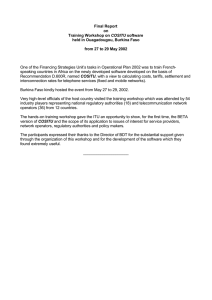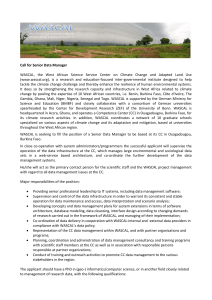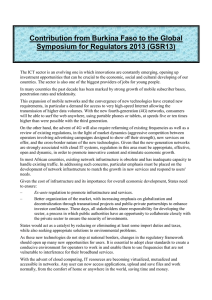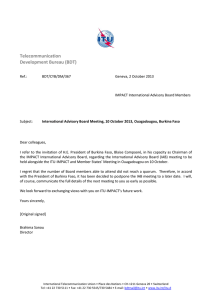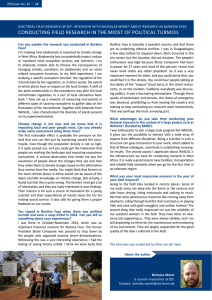Measuring Results Development goals and the drive to improve global statistics
advertisement
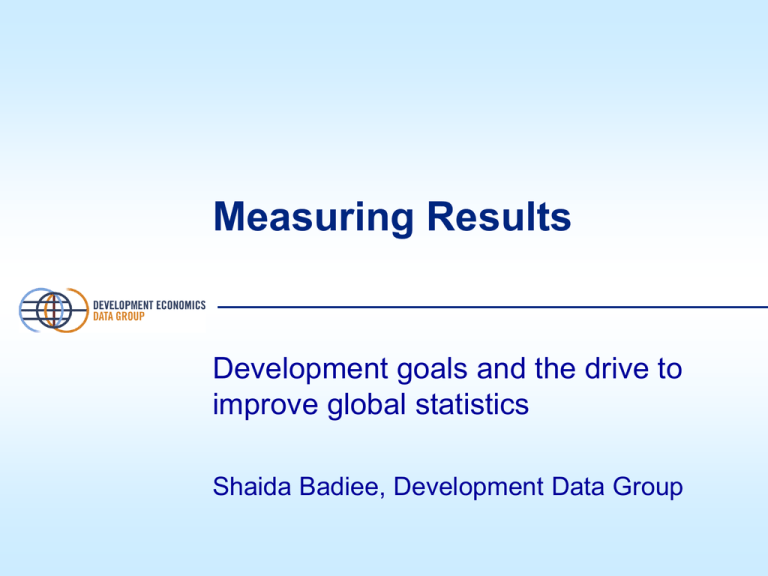
Measuring Results Development goals and the drive to improve global statistics Shaida Badiee, Development Data Group The need for good statistics • Development is about people. But to measure development and see its effect on people, we need good statistics. James D. Wolfensohn • … if we do not improve our statistical capacity in developing countries, this great opportunity will be lost. Clare Short,1999 • If you can’t measure it, you can’t manage it. Trevor Manuel, 2001 Results and National Statistics • Good quality national statistics are needed to “manage for results” • Developing countries ― manage their poverty reduction strategies and report progress to their citizens • Development partners ― increase the effectiveness of their aid programs • Civil society ― increase accountability of public agencies • The private sector ‒ plan investments and make markets work How well can we measure results? Statistical capacity indicator: Practice Statistical capacity indicator: Collection Statistical capacity indicator: Availability Capacity scores and GNI per capita Sustainable statistical capacity is possible in low income countries Statistical capacity lowest in IDA countries …there have been improvements …in some regions more than others Change 1999 to 2004 Statistics in PRSPs and CASs PRS monitoring needs national statistics Outcome indicators are used extensively, including those required for monitoring MDGs and IDA 14 BUT a review of Joint Staff Assessments reveals that the capacity to produce and use them is limited AND remedial action is insufficient - even though many CASs identify the issue only some (e.g. results-based CASs) recommend action Actions to improve National Statistics 1. Monitor statistical capacity to better inform development processes • Standard report on country statistical capacity, work with partners to share information about relevant capacity building initiatives Monitoring statistical capacity Burkina Faso Statistical capacity at a glance Basic country information Population 12.1 million GNI per capita Statistical practice 100 80 $300 US 60 40 Statistical capacity score (on a scale of 0-100) Burkina Faso IDA-IBRD average Overall 63 60 Statistical practice Data collection 40 70 55 54 Indicator availability 80 72 20 0 Indicator availability Data collection Burkina Faso Legal / strategic framework Statistical practice Data collection World Bank projects Statistical law IDA-IBRD average Statistical system information Law 040/96/ADP of November 8, 1996 NSDS / Statistical master plan Schéma Directeur de la Statistique du Burkina Faso 2004-2009 NSDS status Completed / Adopted National accounts methodology SNA68 BOP (manual in use) SDDS/GDDS (subscriber) BPM4 GDDS Population census (latest year) 1996 Vital registration system (coverage) Not complete Agricultural census (latest year) 1993 Household surveys (recent years) Priority Survey (2003, 1998, 1994); DHS (2003, 1998, 1992)…. STATCAP Development of the National Statistical System (IBRD/IDA, 2004) High statistical content Statistical Master Plan (TFSCB, 2003) Actions to improve National Statistics 1. Monitor statistical capacity to better inform development processes • Standard report on country statistical capacity, work with partners to share information about relevant capacity building initiatives 2. Implement Marrakech Action Plan for Statistics • MAPS target: national statistical strategies in all IDA countries by 2006 Marrakech Action Plan for Statistics • National level • Promote strategic planning of statistical systems • Prepare for the 2010 census round • Increase financing for statistical capacity building • International level • Set up an international household survey network • Undertake urgent improvements needed for MDG monitoring by 2005 • Increase coordination for international statistical system Progress on MAPS • Trust Fund for Statistical Capacity Building and PARIS21 • supporting development of national statistical strategies • STATCAP lending program • approved in March 2004 • 2010 census round • UNSD leading • International Household Survey Network • launched in September 2004 Actions to improve National Statistics 1. Monitor statistical capacity to better inform development processes • Standard report on country statistical capacity, work with partners to share information about relevant capacity building initiatives 2. Implement Marrakech Action Plan for Statistics • MAPS target: national statistical strategies in all IDA countries by 2006 3. Accelerate production of key indicators • Pilot program to demonstrate improved survey data collection and reporting practices Accelerating progress Country Angola Benin Burkina Faso Burundi Cameroon Central African Rep. Chad Congo, Dem. Rep. Congo, Rep. Côte d’Ivoire Eritrea Ethiopia Gambia, The Ghana Statistical Population capacity score (%) 13.5 6.7 12.1 7.2 16.1 3.9 8.6 53.2 3.8 16.8 4.4 68.6 1.4 20.4 35 55 63 42 48 27 53 38 37 75 37 65 52 52 % of MDG indicators with an estimate in 2000-2002 69 73 66 80 80 63 70 67 68 63 76 90 70 69 1999 2000 2001 2002 2003 The capacity to M produce D statistics C, Q 2004 2005 Q M (D), M Q, D M M M M Q M I D D Q M D I M C M MAnd M M the plannedQ program ofD national & M D D international surveys M (D), M C C D Q Are not sufficient to meet the demand for better indicators What can be achieved over the next 3 years 1. Improved global monitoring and reporting • Of statistical capacity and support for statistical capacity building 2. Good quality NSDS for all IDA countries • Where feasible, with resources for implementation • Broader inclusion of statistics in national plans 3. Pilot program in a number of countries • Accelerated production of key indicators 4. Other actions of MAPs: • Support for countries preparing 2010 census • Securing additional resources for MAPs
